To mark the release of Apostasy – the debut production from Daniel Kokotajlo – we had the pleasure of sitting down with one of the film’s leading stars Robert Emms. The actor, best known to audiences in roles in Jurassic World: Fallen Kingdom, War Horse and Kick-Ass 2, plays a Jehovah’s Witness in this controversial feature film. We met for a coffee on a hot Summer morning, to speak about his role, the research he undertook, as well as his experiences collaborating with Spielberg – and he tells us why acting is still, after all these years, a dream profession….
The film can be quite stressful to sit through, and I mean that as a compliment.
The unique thing about this about film is that it never explodes, like in a lot of films, there’s always a moment when it boils over. But this never does, it’s forever suppressed and it’s such an uneasy feeling.
When a film does thrive so much in the tone and at the atmosphere, I guess you won’t know if that’s been accomplished until you’ve seen it?
Yeah, and I think they found a lot of it in the edit. Dan changed the ending, we shot a different ending than what’s in the film. The ending of the film is much more effective. It’s much better this way. The original ending felt like it had been done before. But it was a great project to be involved in, especially because of Dan’s own personal story within the community, because he was Jehovah’s Witness himself. This is a very personal story to him, he left the faith and he’s had some complicated situations arise from it for himself, and he’s put it into a film. When you publicly speak out against the Church, it warrants being disfellowshipped in itself, so it’s a really brave statement for him to make and to tell this story. So for us it was just great to be a part of that, because the film was coming from a real genuine place. His direction was brilliant too, I did a bit of research into Jehovah’s Witnesses but the most interesting part of it was talking to him, because he was one. My character was probably him at one point in his life. Even the minute details like the physicality of a scene might work, or just the way someone sits, or stands or presents themselves, or the way a line was delivered, he was very specific on how that would be. Certainly for my character, who was so indoctrinated into the faith and so brainwashed by it, that there really is a certain way that he would present himself, and Dan was very keen for me to get that right.
What’s it like for you to sit through? Can you get emotionally involved in the film, and across your whole career, what’s that like watching yourself on screen? Can you ever enjoy it like an audience member might?
It’s really hard. I remember what it felt like doing it, and depending on who you’re playing, because a lot of the time I play quite nervous people, when I’m watching myself doing it I’m just remembering the nervousness, or the feeling of the character, which makes me feel uncomfortable. Especially in this, he’s a very held character, but also quite awkward. When I watch it I just remember feeling like that, and it’s hard to let go of that feeling and enjoy it, it’s difficult.
We don’t actually know an awful lot about your character, did you create a backstory, just for yourself, to help your own performance?
Yeah we had rehearsals where we would talk about stuff like that, that he moved away from his parents who are also devout Jehovah’s Witnesses, and that they had sent him there. He’s quite high up, he’s a young Elder, but to become an Elder you have to have shown a level of dedication and he moves into an area where he feels they need help, they need people. So the story of my character was really about presenting someone who is so deep in that faith, that their whole life is about it, the air they breathe is that. I wanted to show someone who was fully, and totally indoctrinated. As a man in that religion it’s a different experience to a woman, because the consequences of these women are all decided by men and that’s something to really look at, because that happens not only in that religion, but in many other religions as well.
There’s an incredible trio of performances, from Molly Wright, Sacha Parkinson and Siobhan Finneran isn’t it?
The girls at the heart of it are incredible, and they were so well-cast. Molly has a real, natural innocence to her that shone through, and Sacha has a flair and a rebellious streak.
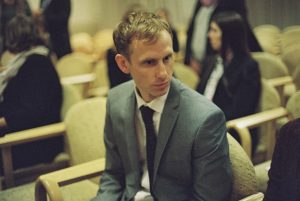 It’s exciting to see what Daniel does next, because this was such a personal project to him, he would have to step out of his comfort zone.
It’s exciting to see what Daniel does next, because this was such a personal project to him, he would have to step out of his comfort zone.
I’m not sure what he has planned, but I would absolutely loved to be involved in his project. Often directors go off and want to work with other actors, but I loved working with him, and we developed a really good shorthand together. He was aware of my work before too, which was nice, so he knew what I was like on screen, he formed an opinion already which was nice. We had a good relationship, he’s a really good director.
In regards to doing research outside of your conversations with him, did you find the Jehovah’s Witness community quite difficult to penetrate? Did they let you in at all? Did you try and speak to anyone about it?
No because it would have been an impossible thing to do, because they would’ve been advised not to be in contact with anyone who had anything to do with our film. I don’t suppose a lot of Jehovah’s Witnesses will watch the film.
Have you had any feedback at all from the community?
From the actual community I don’t know, but I know he’s had a lot of really amazing responses from ex-Jehovah’s Witnesses. When we screened at the London Film Festival there was a lot of them in the audience, and they had a lot of questions and feedback, mostly to say what a great story it was to be told, and how pleased they were it was being told. They’ve had similar experiences, or had friends who had.
You spent months trying to get into the heads of a Jehovah’s Witness, trying to understand how they work. So now when you now walk past them on the street, is there an odd, newfound relationship with them?
There is, definitely. Also after seeing the film I suddenly saw them everywhere. It’s an interesting point, I do definitely have that now, when I walk past them I feel curious now, more than I ever would’ve been before, when I would’ve just been dismissive. Sometimes I want to engage with them just to chat, but then I’m worried I’m going to get drawn in. I’m sure they’ve all got a story.
When you make a film that takes a very barbed look at faith and religion, were there any slight apprehensions in the back of your mind in regards to getting involved, because it’s a quite brave project to make, because people do get very protective and very hurt when their religion is questioned. Did that even come into your mind at all?
I don’t think about stuff like that. My character in a way is not necessarily one who criticises the faith anyway, he is dedicated. The only thing I really think about is whether it’s a story worth telling and if it’s a story I believe in. In Happy Valley I play a serial killer who killed prostitutes, but obviously I don’t believe in that, but the heart and the sentiment of the story being told was a question that interested me, which is ‘can you be born evil’? So that’s why I thought playing that role would be a good thing. In this, I’m interested in the idea of communities to oppress people, and what are the consequences when people are oppressed within closed communities. But then there are projects you get an as actor that don’t interest you, but it’s rare because there’s a lot of amazing material being written. I did get one thing through recently which was really cheesy that was about celebrating the notion of hunting terrorists, and I just thought, I don’t know if I want to be a part of that. I’m anti-terrorism, but the sentiment was a too celebratory, and I just didn’t want to be a part of it.
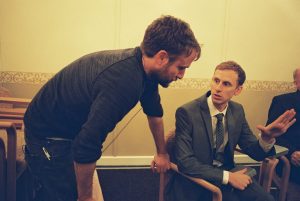 It must be tough to balance – particularly at the beginning of an actor’s career. Because there will be a stage where you want to be offered work, given exposure that will lead to other jobs, but you may be offered projects that you don’t necessarily like. Was that tough for you? Thinking ‘I don’t like this movie, but it gets my face on screen’?
It must be tough to balance – particularly at the beginning of an actor’s career. Because there will be a stage where you want to be offered work, given exposure that will lead to other jobs, but you may be offered projects that you don’t necessarily like. Was that tough for you? Thinking ‘I don’t like this movie, but it gets my face on screen’?
Yeah I do think that is a difficult thing actually. There are some amazing people who really stand their ground and they know what they want, and they’re brave about it. But I never was. I was lucky enough to get really great projects right from the start, but I certainly auditioned for things that I wasn’t sure I actually wanted to do. Now I’m in a lucky position where I don’t feel like that, but at the start it’s a difficult thing, that’s a good observation. It’s about questioning why you’re doing it.
Do you remember the point for you when it became a job and not a dream? There must be that period for actors when you’re thinking… Am I an actor yet? Is it actually my job?
Well it still feels like a hobby because it’s so fun and I’m so lucky to be doing it. But yeah I do remember that moment. I remember when I left drama school and I was holding down two jobs to pay rent and bills, and beer money, but I suppose after I did War Horse is when I really felt that now I’m actually doing this and I felt like there was a future and I didn’t have to worry so much, I could relax. But acting still feels like a dream, I get sent amazing projects from my agent all the time and a lot of them are just dream roles. Some come through and some don’t. It’s not one big dream, it’s lots of little dreams.
It must’ve been amazing working with Spielberg on War Horse?
It was incredible. Such a huge machine as well, and he’s just so slick at his job. He’s editing it while he’s shooting it, he just knows how to tell a story. It was a real privilege. I did the War Horse play and he found me in the theatre, he saw me in the show one night and effectively offered me the part backstage. I was ecstatic. It was a great turning point for me in my career.
Who is the one person you would most like to collaborate with one day?
Lenny Abrahamson is great, and so is Luca Guadagnino. There are loads of independent film directors I would love to work with. I would love to work with Mike Leigh on something too. It would terrify me but I’ve had friends who have auditioned for him, and you have to improvise in the room with him, and I’d love to do that, a great challenge.
Because a lot of people will have recently seen you in Jurassic World. You’re in the film for a short period, it’s like being a sub coming on for the last 10 minutes in a football game, you have this short period of time and you’ve just got this one shot, can it be hard to make an impact and show off your credentials to a huge audience? In some ways is that harder than having a leading role like you do in Apostasy?
It’s much easier in Apostasy, yeah. Because you have a bigger through-line, your character is more significant and has more meaning in the piece. So yeah it is more challenging. But with Jurassic World what was lovely is that because it was the opening sequence and it was standalone to the rest of the film, when we shot it, it felt like shooting a short film, because we did it over the period of two weeks. We were developing it together over that time, coming up with moments that really worked, so it felt a lot more than what it was on screen, I felt like I was in my own film.
It was like a Pixar short at the beginning of a movie. Just a very violent one.
Yeah it was, it was great. I just got offered it, a real surprise, I didn’t audition they just phoned and asked me to do it. I was shocked. It was such a great opportunity, and I got to be in a Jurassic Park film, which will probably never happen again.
Definitely not for your character.
Yeah! I think the Radio Times called it one of the best sequences from the franchise, which was incredible, so it was great to be a part of it.
I think back to my own relationship with films like Jurassic Park when I was growing up, and everything about it is so treasured and stuck in my mind, it must be nice to know there is a new generation of kids now watching the new one, and you’ll always be ‘that guy in the yellow jacket’ which will stay in their heads forever.
It’s amazing, yeah. Like you say, I have memories of the first one that are so vivid in my mind.
Being an actor is a pretty sweet job, isn’t it?
It is brilliant. Often when I’m working on something I look at my colleagues and just think, god this is a stupid job. But stupid in a good way. It’s brilliant.
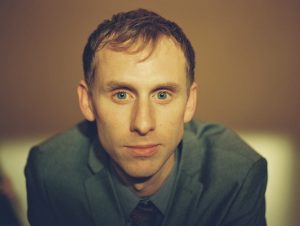 Was being an actor what you wanted to do throughout your whole childhood? Did you have a back-up career in case it didn’t work out?
Was being an actor what you wanted to do throughout your whole childhood? Did you have a back-up career in case it didn’t work out?
I was going to go to music school, I play the piano. I started learning when I was six, and I tried to do that, and I was going to study it, but at the last minute I changed my mind as I had started doing youth theatre and I preferred it. I love playing the piano and I still do it now as a hobby, but I found it much more interesting to work with a group of people, it was less lonely and solitary. There’s a difference too between technical art-forms, because while playing the piano is an emotional art-form as well, it’s very technical, you have to play it in a certain way, whereas with acting, I don’t think it’s a technical art-form at all, I think filmmaking is obviously, but not acting. There are techniques you can use, but in terms of your interpretation of a role, there’s much more to play with, it’s more open, and that was more appealing to me because you can go wrong less. If there’s one person who hates your performance, there will always be one person somewhere who thought it was good.
Do you hope to move between indie and blockbuster, and make passion projects and then take a small role in a huge film. A nice way to pay the bills that then allows you to take on the projects you feel more emotionally attached to?
Yeah I really want to keep doing that. Now I have spread myself across TV, film and indie film and those are all the things I love. I would love to do more theatre, because that’s where I started and it’s where my love grew. But all the while, the other stuff is coming through and I’m obliged to say yes to those really, because they’re usually great opportunities.
When I was growing up it felt like there were film actors and TV actors, and now it feels like there’s no such thing. You have people like McConaughey and Harrelson in True Detective and Ewan McGregor in Fargo. Has it opened up doors for actors like yourself, because I guess anything is now available to you?
Yeah I think so, yeah. There’s a real crossover. Theatre needs to catch up in that respect, I feel there’s still a slight snobbery to TV and film actors, not the stars, because they can be put in plays easily, but jobbing film and TV actors I still think there needs to be more of a crossover into theatre. But yeah it’s great, and there’s so much content at the moment, too much, even.
It is hard to keep up.
Yeah and it’s a shame for those projects because it gets very competitive. A friend of mine did a film and it went onto Netflix, and if it doesn’t get those views it just goes to the bottom and it stops popping up and it goes into the ether. It’s sad for those projects.
Though that said, the accessibility is amazing.
Yeah and also what’s good is that you can do a series a while back and it’s still on Netflix, and people can watch things you’re in from years ago, and that wouldn’t have happened before. And take Apostasy, it’s available On Demand through Curzon which is great because there are a lot of people who would enjoy this film that could’t get to a big city to see it in the cinema. Like my grandma, she’d have to come to London to see it, but people can just watch it at home.
What are your career aspirations? Do you think far into the future?
I try not to think too far ahead. You just can’t. Everything is so hypothetical in this job, I’ve come close to so many jobs that could change my life, but there’s no point thinking about what you get and what you miss, so in 10 years time maybe I will have got one of those massive projects, or maybe everything goes wrong. But I would like to busier, I’m greedy, I just want to be busier. I want to be able to go from project to project without a break, I actually like being busy. I don’t mind a week off here and there, but I like to be busy, that’s the only thing that doesn’t quite satisfy me with the job.
So what can we see you in next?
I’m doing a series called Chernobyl, but that’s still shooting. But in September I have a thing coming out called Cleaning Up, which is a six-part series on ITV with Sheridan Smith, and that was a comedic role so a bit lighter which was fun.
So what do you do in the interim? How do you keep busy between shoots?
I’m developing a project myself, I’m co-writing a series, and a film as well, but focusing on the series, and that takes up a lot of my time. It requires a lot of reading and research, and trying to get some attention on it. That’s been a focus. Either that or I go to the north of Spain quite a lot, because I like it over there and I speak Spanish and I love their culture.
Apostasy is out in cinemas now.

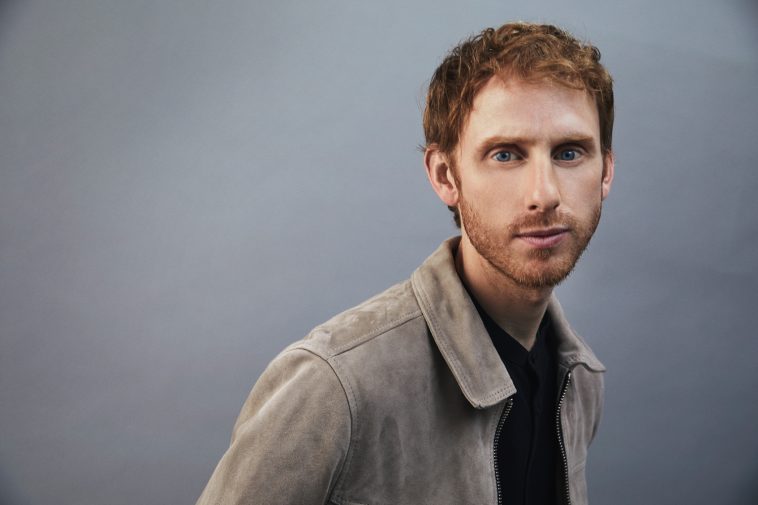
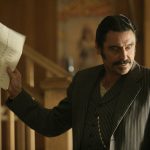
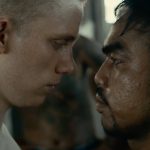


Leave a Comment